The death of ex-President Muhammadu Buhari at 83 ends the tenure of one of Nigeria’s most polarising leaders. Yet it comes at a time when the country is making reforms to reverse the structural flaws and economic hardship that marked his regime.
This moment provides an opportunity to examine the concrete steps taken since 2023 to resolve issues of security, corruption, and economic deprivation that hurt Nigerians in the eight years prior.
Decentralised policing
One notable sector that has become enhanced since 2023 is decentralising policing. Since years of Buhari rule, security challenges worsened owing to the extremely centralised federal police system, resulting in sluggish and ineffective local action.
In the years after he bowed out of office, several states, particularly in Kaduna, Katsina, and Zamfara, have established properly coordinated community policing units, employing technology and local intelligence to keep kidnappings and banditry in check.
These state-sponsored programs, with large support from grassroots vigilante groups, have reduced the spate of kidnappings in previously tense regions, creating a replicable model for security sector reform that the federal government is currently examining for larger-scale adoption.
Diversification and Fintech
Economy-wise, the Buhari administration was riddled with forex instability, mounting debt, and rampant inflation—and complete with many unsuccessful fiscal policies. Recently, a targeted drive towards diversifying the economy through agriculture and technology is weaning the country from oil dependency—a crisis that plagued the country for years.
The Central Bank of Nigeria has moved towards a unified exchange rate system, reducing opportunities for arbitrage and improving investor confidence.
Simultaneously, fintech-led solutions such as digital microloans for farmers and agritech innovations have empowered smallholder farmers to access markets more efficiently, stabilizing food supply in urban centres and reducing the impact of inflation on essential commodities.
Access to Power with renewable energy
The renewal of Nigeria’s energy sector through decentralized renewable energy projects represents another critical reform in recent years, addressing persistent power outages that worsened during Buhari’s tenure.
Through the Solar Power Naija program and independent mini-grid ventures, over 1.2 million Nigerians in rural communities gained first-time access to electricity, reducing dependence on petrol and diesel generators and sparking a burst of growth for small businesses in far-flung communities.
With World Bank and Rural Electrification Agency funding, the projects have provided cleaner, more stable power while creating local jobs and boosting healthcare delivery in such states as Gombe, Niger, and Ogun.
Smarter social protection
Also, since 2023, Nigeria has progressed data-driven social protection reforms to mitigate the abject poverty induced by stubborn inflation under the Buhari-led government.
The National Social Register, which was underutilised, has been cleaned and digitized, allowing targeted cash transfers to the poorest families with minimal corruption.
With UNICEF and World Bank partnerships, governments like Kaduna, Ekiti, and Jigawa have taken the lead on these targeted interventions, linking beneficiaries to vocational training in skills and microcredit facilities to transition them into sustainable livelihoods.
This approach not only provides short-term relief but also builds resilience, with initial results showing decreases in child malnutrition, school dropout, and volatility of household income in beneficiary communities.
Civic and economic inclusion
One important long-term intervention implemented since 2023 is youth-oriented political and economic engagement, redressing disenfranchisement which cratered under Buhari.
Through such programs as the National Youth Participation Framework, Nigerian youths are being mainstreamed into local government institutions, budget following, and decision-making in several states.
A turning point, not just an end
The demise of Muhammadu Buhari is however, not merely the end of a controversial political leader but a turning point for Nigeria’s journey toward transformation.
While his administration failed on its campaign promises, solutions quietly set in motion since 2023 such as decentralized security, economic diversification, technology-driven transparency and youth inclusion are already showing promise in addressing Nigeria’s structural challenges.
Essentially, Nigerians can use this moment to champion these reforms, ensuring that the cycles of fragility that characterised Buhari’s tenure do not define the nation’s future.
The death of ex-President Muhammadu Buhari marks the end of a polarizing political era in Nigeria, leaving behind issues of insecurity, economic fragility, and governance inconsistency. Since 2023, Nigeria has been implementing significant reforms to address these challenges. Decentralized policing through state-initiated programs has improved community security by reducing kidnappings with the help of local intelligence and technology. Economic diversification efforts, focusing on agriculture and technology, have reduced forex instability and improved food supply by enhancing farmer access to markets.
Furthermore, the energy sector is being revitalized with renewable energy projects, notably providing electricity to rural communities and reducing reliance on fossil fuels, thus encouraging local economic growth. Social protection reforms have become more data-driven with a digitized National Social Register, effectively targeting cash transfers and linking beneficiaries to support mechanisms that enhance economic stability and reduce poverty. Additionally, youth inclusion initiatives are promoting political and economic empowerment.
Collectively, these efforts mark a turning point for Nigeria, representing a dedication to overhaul deeply entrenched systemic weaknesses that characterized Buhari's governance. The reforms showcased promising outcomes, urging Nigerians to advocate for their continuation to avoid repeating past cycles of instability.






